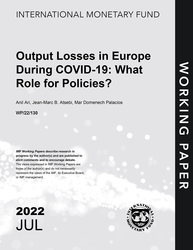
Output Losses in Europe During COVID-19: What Role for Policies?
Output Losses in Europe During COVID-19: What Role for Policies?
READ MORE...
Volume/Issue:
Volume 2022
Issue 130
Publication date: July 2022
ISBN: 9798400215247
$20.00
Add to Cart by clicking price of the language and format you'd like to purchase
Available Languages and Formats
| English |
Prices in red indicate formats that are not yet available but are forthcoming.
Topics covered in this book
This title contains information about the following subjects.
Click on a subject if you would like to see other titles with the same subjects.
Banks and Banking , Economics- Macroeconomics , Public Finance , Economics / General , COVID-19 crisis , output losses , monetary policy , fiscal policy , fiscal multipliers , growth outcome , output loss , decomposition methodology , types of fiscal policies , monetary policy support , COVID-19 , Central bank policy rate , Income inequality , Europe , Global
Summary
We use a decomposition methodology to analyze the factors underlying the differentiated output losses of European countries in 2020. Our findings are fourfold: First, 2020 growth outcomes can be explained by differences in mobility, underlying growth trends, and pre-pandemic country fundamentals. Second, fiscal and monetary policies helped alleviate output losses during the pandemic in all European countries but to a varying extent. Third, shallower recessions in emerging market economies in Europe can be attributed to higher underlying growth and younger populations. Fourth, fiscal multipliers were higher in countries where above-the-line measures accounted for a larger share of the total fiscal package, the size of the total fiscal package was smaller, and inequality and informality were greater, as well as in countries with IMF-supported program during the pandemic.
Copyright © 2010 - 2026
Powered by:
AIDC



